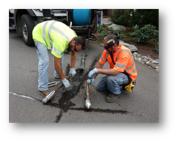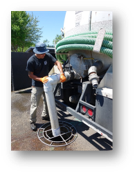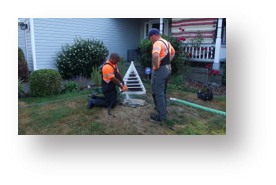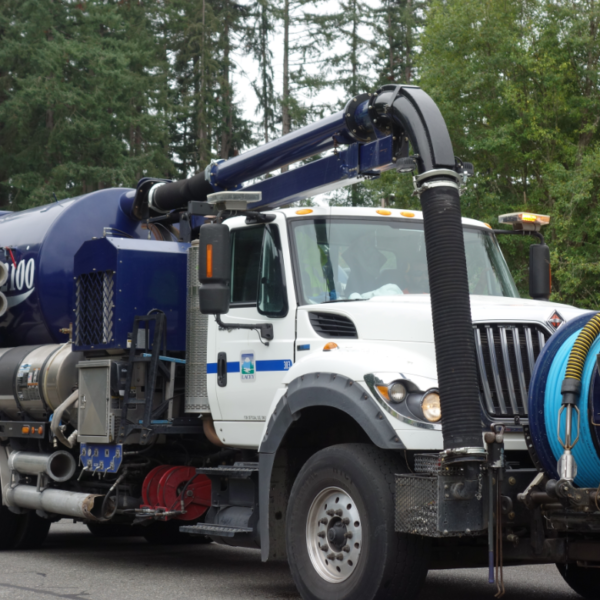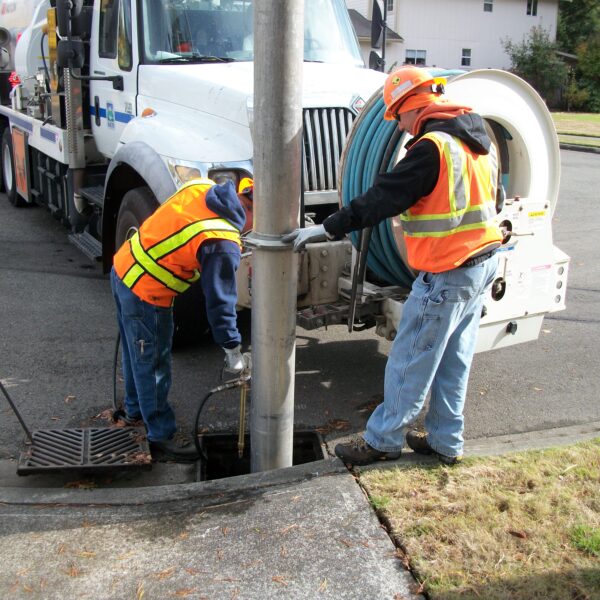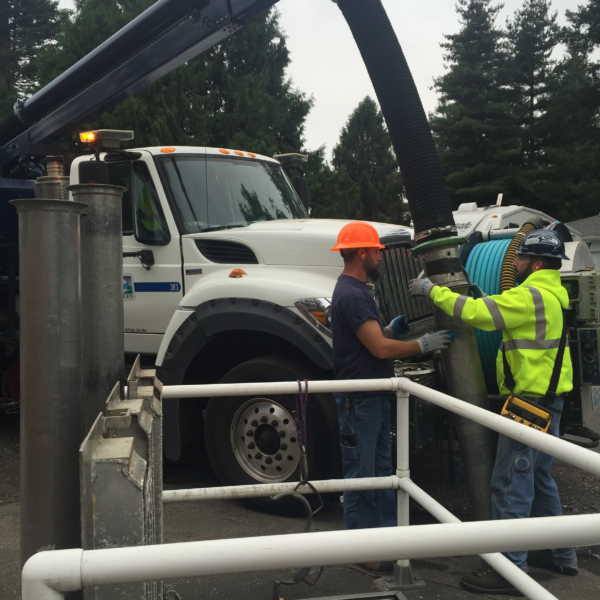Wastewater Programs
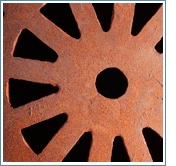
Wastewater Programs and Services
The City of Lacey Wastewater Utility currently serves about 44,000 people. The utility ensures that wastewater from Lacey is properly collected from sinks, drains, and toilets and delivered safely to the LOTT Clean Water Alliance Wastewater Treatment Plant. Some of the wastewater that is collected is delivered to the Hawks Prairie Reclaimed Water Facility, where it’s reclaimed and turned into a valuable resource. Learn more about the City of Lacey’s Reclaimed Water Program.
City of Lacey Wastewater System
What type of system takes care of your waste?
To find out if you are a SEWER or SEPTIC customer, take a look at your water bill. Under the billing details section, you will see two-letter codes before each line item that designate the type of account charge.
WR – Lacey Water Customer
WW – Sewer Customer (most likely gravity)
SP – Sewer Customer on STEP system
GR – Sewer Customer on Grinder system
If you see WW, LOTT, SP, or GR then you are a City SEWER customer. If you do not see any of these, it means you are on a SEPTIC system.
Sewer: Gravity
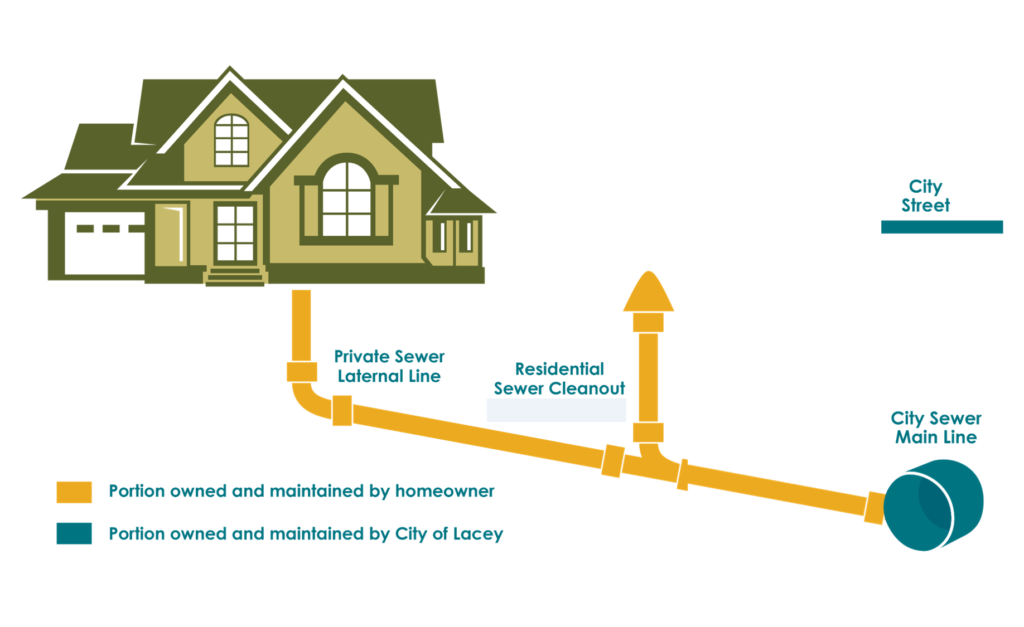
The easiest way to transport wastewater is by gravity! Sewer lines are built to follow a natural downhill slope. This allows wastewater to flow through pipes until reaching a lift station, which can then pump it uphill towards the treatment plant. The property owner is responsible for the sewer line from the house to where it connects to the sewer main in the street (in some instances there may be exceptions to this).
Here’s some tips to keep your pipes clear and avoid blockages that cause back-ups.
- Only flush the 3 P’s – pee, poop, and (toilet) paper.
- Ensure only water goes down your drains. Compost or throw away excess food scraps and try to avoid using the garbage disposal.
- Let fats, oils, and grease (FOG) cool before scraping them into the trash. When these go down the drain, they cool inside pipes and build up over time!
Sewer: STEP
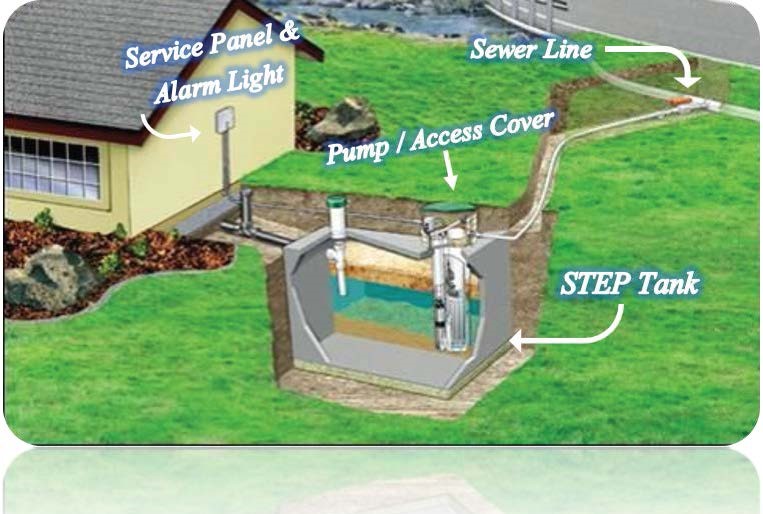
STEP stands for Septic Tank Effluent Pump. While the property owner is responsible for the sewer line that runs from your house to the STEP system, the City of Lacey maintains the system itself. Because the City owns the STEP system and it is considered part of the City’s utility system, there is no requirement to have the system pumped if you sell your home.
The STEP tank and pump are buried in your yard and are controlled by an electrical panel on the side of your house. The wastewater from your home flows into the septic tank where solids settle out and form sludge on the bottom of the tank. The liquids flow through a screen and get pumped into the City’s sewer line for transport to the LOTT treatment plant.
The City of Lacey maintains your STEP system and comes to pump & inspect it every 8 years. When crews arrive to perform preventative maintenance on your STEP system, they will first knock on your door to let you know they will be working. Check out this brochure for more information.
Caring for you STEP system:
- Maintain at least a 3-foot clearance around the green tank lid(s) in your yard and a clear path to the control panel on the side of your home. Without clearance, crews maybe unable to perform maintenance.Ensure only water goes down your drains. Compost or throw away excess food scraps and try to avoid using the garbage disposal.
- Never drive or park anything on top of your STEP system.
- Ensure that water, toilet paper, and human waste are the only things that go down the toilet and drains.
- Do not add septic aid products to your system or put chemicals down the drain.Excessive use of your garbage disposal can clog your system. Throw away or compost excess food, coffee grounds, eggshells, fats, oils, grease, etc.
- Locate the STEP system’s breaker in the home’s electrical panel. Make sure this breaker is on at all times. If the breaker is turned off or trips, there will be no power to run the pump and you could experience sewer backup or overflow.
- If your tank lid becomes damaged, secure the area and report it to t he City of Lacey Maintenance Service Center at (360) 491-5644 as soon as possible.
- Call before you dig. Its the law! Do not dig around your tank unless underground utilities have been located. Homeowners can request utility locates by calling 1-800-424-5555 (or *811 on your cell phone) or online at http://www.callbeforeyoudig.org/washington/index.asp.
If your STEP system alarm goes off:
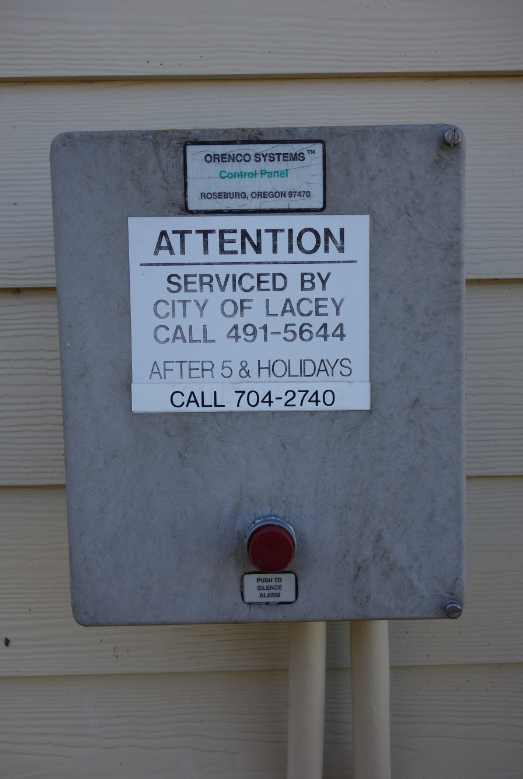
- You will hear a loud alarm, similar to a car alarm, coming from the control panel located on the side of your home.
- Press the red button to silence the alarm. The red light will remain on while the alarm is active.
- Restrict water use by not running your washing machine or dishwasher until City crews can determine the cause of the alarm. As long as sewer is not backing up in the home, brief showers and toilet flushing is okay.
- Immediately report the alarm to the City of Lacey Maintenance Service Center at (360) 491-5644 during business hours or at (360) 704-2740 during nights/weekends.
If sewer is backing up inside of your home:
- Immediately call the City of Lacey Maintenance Service Center to contact our wastewater staff at (360) 491-5644 during business hours or at (360) 704-2740 during nights/weekends. Technicians are available 24/7, 365 days a year to respond to sewer emergencies.
- Do not use your washing machine, dishwasher, take showers/baths, or flush water down drains or toilets until crews can determine the cause of the overflow.
If the power goes out:
- Restrict your water use and do not use the dishwasher or washing machine and do not take showers or baths until power has been restored. You can flush the toilet unless you have sewer backing up in your home. If this occurs, call the City of Lacey Maintenance Center immediately for assistance (360) 491-5644.
- The STEP tank has reserve storage capacity that should be sufficient if you limit your water use.
- If you notice a sewage overflow or experience back-ups, immediately notify the Lacey Maintenance Service Center.
- When the power comes on again, it is normal for the alarm to go off. Silence the alarm (by hitting the red button on the control panel) and check the alarm panel again after 30 minutes. If the alarm light is still on, contact the Lacey Maintenance Service Center for assistance.
Sewer: Grinder
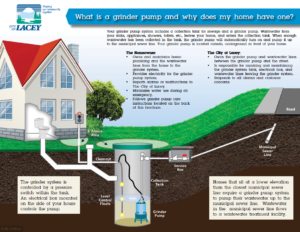
A grinder system is composed of a collection tank for sewage and a grinder pump, both of which are buried in your yard. There is also a gray control panel on the side of your home. Wastewater from your sinks, appliances, showers, toilets, etc leaves your home and enters the collection tank underground. When enough wastewater has been collected in the tank, the grinder pump will automatically turn on and pump it into the City’s sewer line.
Typically grinder systems are used when homes sit at lower elevations and wastewater must be pumped uphill in order to enter the City’s sewer system.
Caring for your Grinder System
- Maintain at least a 3-foot clearance around the tank riser lid and a clear path to the control panel on the side of your home. Without clearance, crews may be unable to perform maintenance.
- Never drive or park anything on top of your grinder system.
- Ensure that water, toilet paper, and human waste are the only things that go down the toilet and drains.
- Do not add septic aid products to your system or put chemicals down the drain.
- Excessive use of your garbage disposal can clog your system. Throw away or compost excess food, coffee grounds, eggshells, fats, oils, grease, etc.
- Locate the grinder system’s breaker in the home’s electrical panel. Make sure this breaker is on at all times. If the breaker is turned off or trips, there will be no power to run the pump and you could experience sewer backup or overflow.
- If your tank lid becomes damaged, secure the area and report it to t he City of Lacey Maintenance Service Center at (360) 491-5644 as soon as possible.
- Call before you dig. It’s the law! Do not dig around your tank unless underground utilities have been located. Homeowners can request utility locates by calling 1-800-424-5555 (or *811 on your cell phone) or online at http://www.callbeforeyoudig.org/washington/index.asp.
If your grinder system alarm goes off:
- You will hear a loud alarm, similar to a car alarm, coming from the control panel located on the side of your home.
- Press the red button to silence the alarm. The red light will remain on while the alarm is active.
- Restrict water use by not running your washing machine or dishwasher until City crews can determine the cause of the alarm. As long as sewer is not backing up in the home, brief showers and toilet flushing is okay.
- Immediately report the alarm to the City of Lacey Maintenance Service Center at (360) 491-5644 during business hours or at (360) 704-2740 during nights/weekends.
If sewer is backing up inside of your home:
- Immediately call the City of Lacey Maintenance Service Center to contact our wastewater staff at (360) 491-5644 during business hours or at (360) 704-2740 during nights/weekends. Technicians are available 24/7, 365 days a year to respond to sewer emergencies.
- Do not use your washing machine, dishwasher, take showers/baths, or flush water down drains or toilets until crews can determine the cause of the overflow.
If the power goes out:
- Restrict your water use and do not use the dishwasher or washing machine and do not take showers or baths until power has been restored. You can flush the toilet unless you have sewer backing up in your home. If this occurs, call the City of Lacey Maintenance Center immediately for assistance (360) 491-5644.
- The system’s tank has reserve storage capacity that should be sufficient if you limit your water use.
- If you notice a sewage overflow or experience back-ups, immediately notify the Lacey Maintenance Service Center.
- When the power comes on again, it is normal for the alarm to go off. Silence the alarm (by hitting the red button on the control panel) and check the alarm panel again after 30 minutes. If the alarm light is still on, contact the Lacey Maintenance Service Center for assistance.
Septic
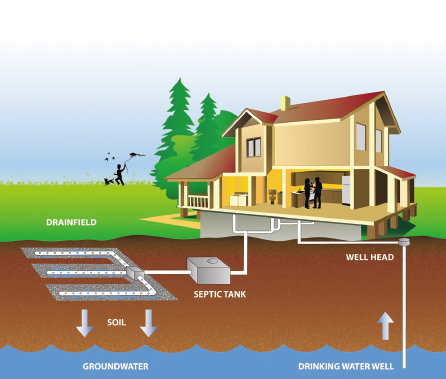
All of Lacey’s drinking water comes from groundwater which means a failing or improperly functioning septic system puts our drinking water at risk. Therefore it is important to have your septic system inspected every 1-3 years and pumped every 3-5 years.
To prolong the life of your septic system:
- Conserve water in your home.
- Do not flush solids like cigarettes, tampons, baby wipes, grease, etc. down the drain or toilet.
- Avoid the use of your garbage disposal or use less frequently.
- Do not use septic tank additives. They do not replace the need to pump your tank.
- Never drive or park a vehicle on your septic tank or drain field.
Information contributed by Jennifer Johnson of Thurston County Environmental Health. If ever you have questions about your septic system, feel free to call Thurston County’s Septic Help Line at (360) 867-2669.
REBATE OFFER!
Lacey water customers with onsite septic systems may be eligible for a rebate to connect to the City Sewer System! The LOTT Clean Water Alliance is currently offering an instant rebate of 50% off your connection fee. Low-income property owners may even be eligible for an additional 25% off connection fees. To find out if you could potentially connect to the City sewer system and get more information, contact Lacey Water Resources at (360) 491-5600 or WaterResources@ci.lacey.wa.us
Help Keep Things Moving!
Fats, Oils, & Grease
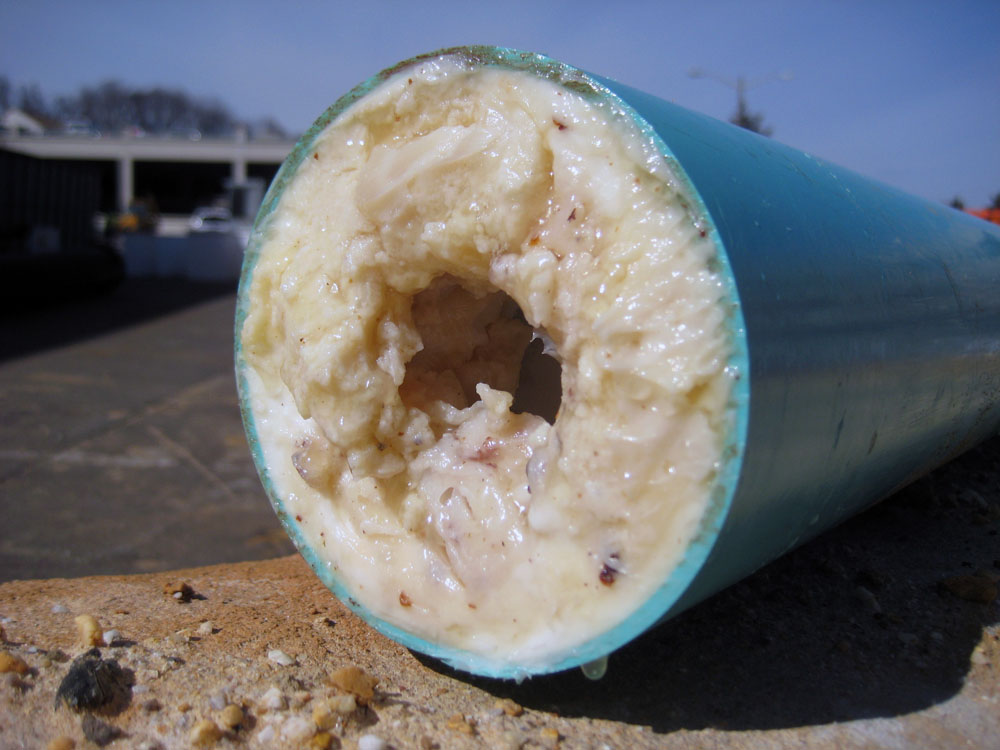
FOG represents all of the fats, oils, and grease in cooking oils, condiments, meat, dairy products, sauces, butter, etc. FOG can clog the pipes in both your home and in Lacey’s sewer mains that run underneath your street. When grease goes down the drain, it cools and sticks to the inside of the pipes. Over time, this builds up and begins to block your pipes.
Worst Case Scenario? So much FOG builds up inside your pipes that it completely blocks the flow of wastewater (sewage) from your home causing a backup (sanitary sewer overflow). This creates a serious public health hazard and can cause extensive damage to your property.
What happens when FOG builds up inside the City’s Sewer System?
Build-up of FOG in Lacey’s sewer pipes requires increased staff time and maintenance for the collection system to function properly and keep waste flowing away from your home and neighborhood.
With FOG
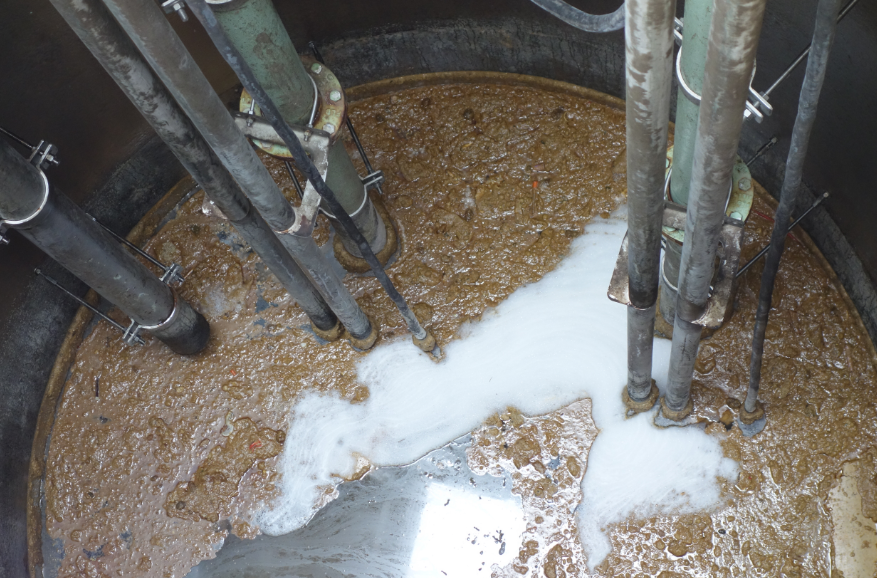
Without FOG
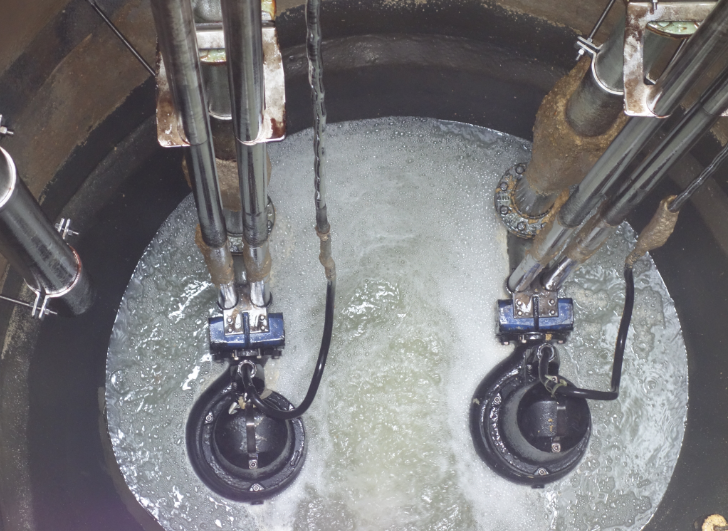
What can you do to keep your pipes clear? Keep your drains fat free!
- Leave fat and oil left over in the pan to cool then scrape it into the garbage.
- Wipe down pots, pans, and silverware with a paper towel before washing them.
- Use your garbage disposal as little as possible. This will reduce the amount of food particles that cling to pipe walls and increase the risk of blockage. Consider composting as an alternative!
- Sewer customers are eligible to pick up a FREE FOG KIT at the LOTT Clean Water Alliance Wet Science Center. For more information visit http://lottcleanwater.org/contact-us/
- Recycle your old cooking oil! Look for the collection station at the Thurston County Waste and Recovery Center.
Flushable Wipes Clog Pipes
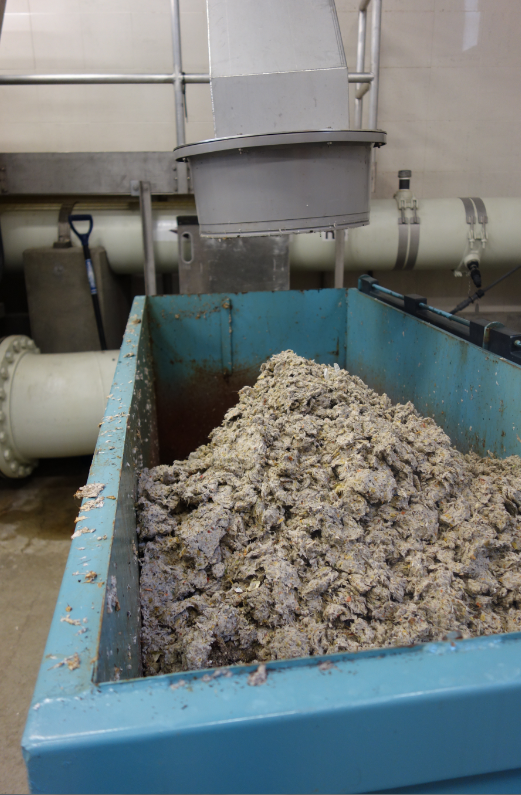
Baby wipes, wet wipes, cleaning wipes, and paper towels should always go in the garbage. These wipes are NOT flushable and do not break down in water. They can clog both your home’s pipes and the City’s sewer mains.
You should also never flush:
- Plastics including feminine products
- Latex products including condoms
- Diapers, cotton swabs, cotton balls, & band aids
- Garbage wrappers & cigarettes
- Yard & garden chemicals
- Hair or tanning dyes
- Pet waste & cat litter
